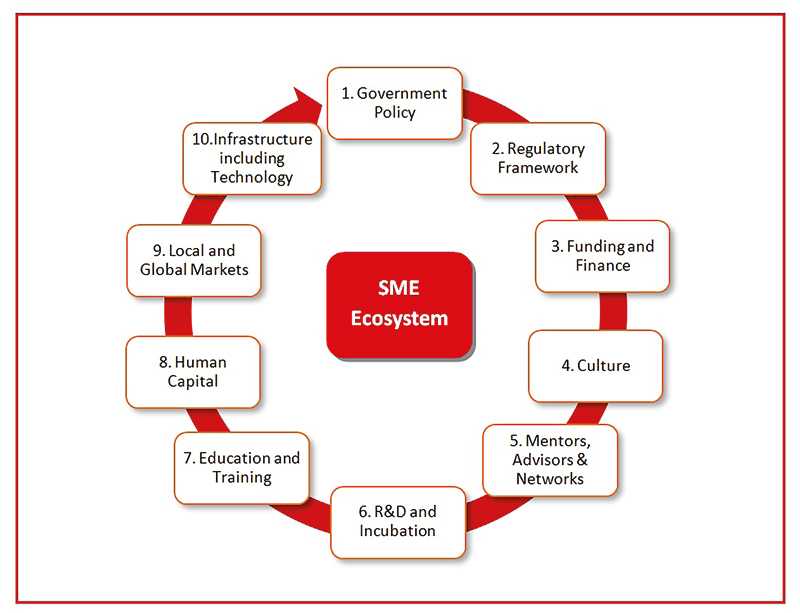Friday Feb 13, 2026
Friday Feb 13, 2026
Thursday, 12 November 2020 00:40 - - {{hitsCtrl.values.hits}}

 Since the day I left my career to become a full time independent consultant/trainer, one of my main focuses was to make an impact to the highly-neglected SME sector of this country and as such I was keen to engage with institutions, task forces and movements that serve this needy segment, while I continued my own efforts.
Since the day I left my career to become a full time independent consultant/trainer, one of my main focuses was to make an impact to the highly-neglected SME sector of this country and as such I was keen to engage with institutions, task forces and movements that serve this needy segment, while I continued my own efforts.
I was able to make an impact on thousands of MSME players over the last few years, especially through training and grooming initiatives in collaboration with like-minded mass media channels, social media, banks, professional bodies as well as private and public sector organisations. I also got an opportunity to be a speaker and panellist as well as a moderator for over 30 SME focused webinars and workshops during the last few months since the lockdown in March and currently serving on a few national level task forces engaged in several missions towards empowering SMEs.
It’s a great honour and privilege to serve as the Strategic Advisor to the apex body of SME industrialists in the country, the Sri Lanka Chamber of Small and Medium Industries (SLCSMI), which is at the forefront influencing the Government for pro-SME policy directions.
While the attempts made by many parties towards uplifting the SME community in the country are highly appreciated, I am not fully convinced that these actions will have a sustainable impact on the segment due to the fragmented approach and most of the initiatives are just painkillers rather than long-term solutions. Hence I thought of sharing some thoughts to initiate a dialogue among those interested parties, policymakers as well as beneficiaries and this is the first article in the series.
SMEs are the backbone of the economy
SMEs have a significant impact on the growth and social development of any nation and are the backbone of most economies worldwide. According to the data provided by the International Council for Small Business (ICSB), formal and informal Micro, Small and Medium-sized Enterprises (MSMEs) make up over 90% of all firms and account, on average, for 70% of total employment and 50% of GDP. The numbers are more or less similar in the Sri Lankan context except the employment which is around 45%.
SMEs as the main income provider for the “base of the pyramid” and employ a larger share of the vulnerable sectors of the workforce, such as women, youth, and people from poorer households including daily wage earners and these are the segments with high vulnerability in times of COVID-19.
Second wave – from frying pan to fire
Most of the SMEs were going through a tough time with the unprecedented disruptions to the Businesses owing to the first wave and they were just getting their head above the water when the Second wave hits them. As the second wave has now come to a critical state with ever-increasing cases, the Government is strengthening the measures taken to control the situation. Consequently, there is a greater anticipation among general public about a countrywide lock-down given that a few other countries have already declared countrywide lockdowns.
Social distancing-based public health interventions, such as mass quarantines, extensive travel bans, and transportation system disruption will affect SMEs heavily given that majority of them are not yet fully geared to operate on technological platforms and do not have doorstep delivery channels. Therefore, it is expected that the government will pay attention towards the cost on SMEs when considering these interventions.
Highly-neglected segment
Since independence successive governments have introduced various support programs to facilitate growth and expansion of SMEs in different sectors of the economy. However, there has been no deliberate effort to exploits the full potential of SMEs. Most policies and incentive schemes for enterprise development have been highly biased towards large-scale enterprises and hence prejudiced against SMEs.
There are many studies and researches that have revealed the inherent challenges faced by the SMEs irrespective of the industry they belong to. Limited access to and cost of capital, low level of technology, limited access to markets and market information, absence of business development services, regulatory and administrative constraints, inadequate institutional support, lack of entrepreneurial skills are among the main constraints. Owing to lack strength and bargaining power, the players in this segment become victims of middlemen’s mafia in most industries. 
Lack of protectionist policy measures by the Government has prevented the blossoming of many SMEs and many indigenous and long lived local industries have been heavily threatened by the growing competition posed by imported products.
Another challenge faced by the traditional industries is the lack of interest by the successive generations to continue the legacy, owing to outdated technology, lack of dignity and poor reception by the society for such enterprises and products. The Government has a major role to play in rebuilding the status for such industries and gain recognition for those products, looking at the cultural and social aspects of such enterprises beyond mere cost-benefit matrices.
Silver lining in the first wave
Despite all the negativities, a silver lining in the first wave was the unprecedented attention from the Government and other institutions towards strengthening local industries, with a special focus on SMEs. The Government took multiple measures to create a conducive environment for SMEs while also rolling out several relief measures including concessionary loan schemes.
The attention paid by the Government to introduce several ministries and dedicated ministers for a number of key industries should be commended. However, this classification looks at the industries holistically without identifying SMEs as a separate segment. As a result there is no guarantee that the interests of SMEs are truly protected and a fair hearing is given to their inherent issues that are not necessarily common across a given industry.
Although, these tentative measures and temporary handholding may provide some breathing space for these enterprises, it is vital that the government focuses on a long-term model to foster entrepreneurship and build sustainable businesses in the SME sector.
SME ecosystem – long overdue
I always believe this country needs a comprehensive ecosystem for SMEs, given the significance to the economy, potential of the sector and inherent vulnerability. When referring to an entrepreneurial ecosystem, many tend to talk about replicating Silicon Valley which is known as the global centre for technological innovation.
Despite its success, the Valley was formed by a unique set of circumstances and any attempt to replicate it in other places is unlikely to succeed. Hence the pragmatic approach would be to build the ecosystem on local conditions. We as a nation have produced many successful ventures via a unique blend of cultural, spiritual and entrepreneurial ingredients. As such it will be much more effective to build on these foundations with a touch of advanced technologies rather than attempting to launch high-tech industries from scratch.
Mason and Brown (2014) defined the Entrepreneurial Ecosystem (EE) as: “a set of interconnected entrepreneurial actors, entrepreneurial organisations, institutions and entrepreneurial processes which formally and informally coalesce to connect, mediate and govern the performance within the local entrepreneurial environment”.
The EE concept is mostly applied in connection with innovation driven high growth start-ups and the roles of each component and characters involved in the ecosystem are defined accordingly. However, SMEs have inherent characteristics such as the inability to afford any of the support services, lack of knowledge, lack of capital, lack of bargaining power, higher vulnerability, etc. and hence it’s necessary to haven an ecosystem that can address these inherent challenges.
Accordingly, I would consider a dedicated ecosystem for SMEs and suggest including 10 key components 1. Government Policy; 2. Regulatory Framework; 3. Funding and Finance; 4. Culture; 5. Mentors, Advisors and Networks; 6. R&D and Incubation; 7. Education and Training; 8. Human Capital; 9. Local and Global Markets; and 10. Infrastructure including Technology to form this ecosystem for SMEs.
The Government is expected to play the leading role in enabling this ecosystem while engaging universities and academic institutions, professional bodies, financial institutions, venture capitalists, chambers, private sector organisations and other interest groups to play different roles.
While I intend to continue this discussion further, let me reiterate the need for a more holistic and dynamic approach consisting of an interactive and systemic view of individuals, institutions and firms within an entrepreneurship context to support SMEs, beyond fragmented activities with short-term relief.

(The writer is a Senior Chartered Accountant, Management Consultant, Business Coach and a Family Business Advisor. He can be reached via [email protected])